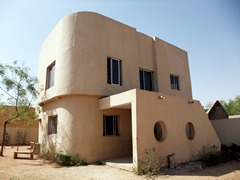Gender Responsive Projects
Case Study
Nigeria: Project on Activation of Women Development Centers
Activation of Women Development Centers
There are over 500 Women Development Centers (WDCs) in Nigeria. However, most of the WDCs are not being run effectively due in main to a lack of funding.
JICA has assisted with the formulation of guidelines for activating WDCs based on experiences through training and providing materials and equipment at six centers in Kano State from January 2007.

A Women Development Center
A Place of Learning that Enhances the Lives of Poor Women
The proportion of people living under the poverty line on less than US$1 a day is extremely high in Nigeria at 70%. The impact of a traditional patriarchal society has exacerbated gender disparity in the adult literacy rate and income.
More than 500 WDCs have been established throughout Nigeria since the latter half of the 1980s for the purpose of empowering women at the grassroots level through vocational training and basic literacy education. The National Centre for Women Development, affiliated with the Nigerian Ministry of Women's Affairs, conducted a nationwide study on WDCs from 2001 and found that although the centers improve the lives of poor women, they are not functioning effectively. The study recognized that needs are not being met mainly due to a lack of funding.
JICA started a three-year project in January 2007 to establish a model for the appropriate management of WDCs to ensure their continued utilization as places of learning and empowerment that contribute to enhancing the lives of poor women. The project activated six WDCs in Kano State through training and by providing equipment and materials, and based on this experience, JICA supported the formulation of guidelines for activating WDCs throughout Nigeria.
As a result, an increasing number of women in the community who previously found it difficult to go out have started using the WDCs of their own accord. Husbands even support their wives going to the centers. The project has also deepened understanding of the WDCs in the community, including religious leaders and village elders. Sewing and knitting machines are provided to WDC graduates via soft loans. In the future, it is expected that the effects of the projects will spread to other states as the guidelines are implemented.




scroll